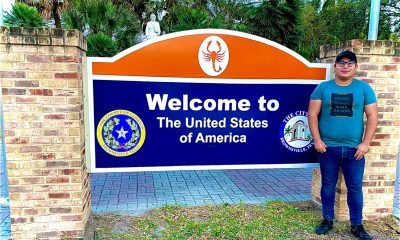News
Migrantes LGBTI en Tijuana ‘buscan una oportunidad para vivir’
Miles de personas en la ciudad mexicana deseen entrar los EEUU
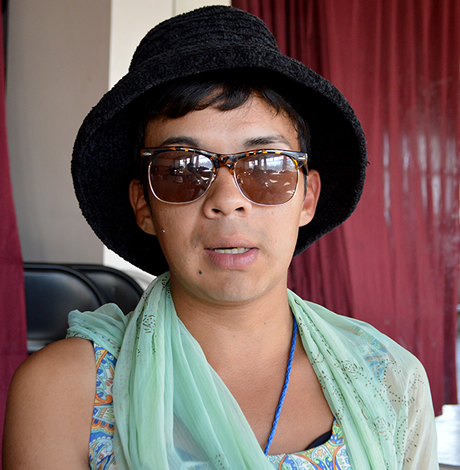
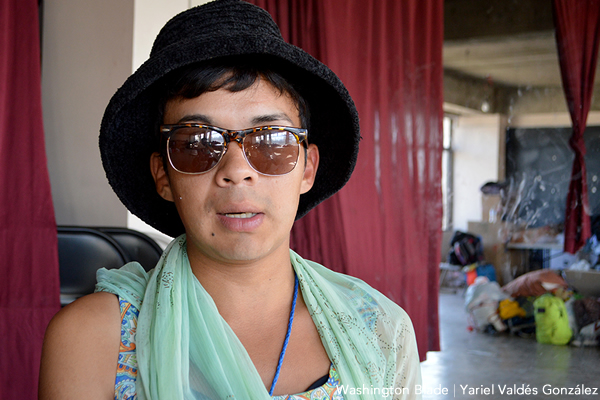
Melani Sofía Rosales Quiñones, una mujer transgénero de la Ciudad de Guatemala, fue golpeada, amenazada y discriminada en su país por el solo hecho de sumir su verdadera identidad de género. (Foto del Washington Blade de Yariel Valdés González)
TIJUANA, México — A Melani Sofía Rosales Quiñones, una mujer transgénero de la Ciudad de Guatemala, la esperaba una banda de homofóbicos a la vuelta de su casa. Era julio de 2017 y al pasar junto a ellos les dijo: Buenas noches y solo eso fue el pretexto para una agresión atroz.
“Me golpearon con bates y palos”, narra ahora Melani. “Me quebraron la mandíbula y el maxilar izquierdo. Estuve tres días sin despertar en el hospital y luego de 15 días me hicieron una cirugía para reconstruirme el rostro. Me pusieron placas y tornillos. Estuve cuatro meses en recuperación”.
Un año antes, las pandillas, que enferman de odio y violencia a medio Latinoamérica, codiciaban su casa como depósito para drogas. Su madre nunca aceptó e interpuso una denuncia por el acoso de las también llamadas “maras”.
“Saliendo de la policía llaman a mi mamá y la amenazan. Le dicen que con ellos no se jugaba y matan a mi hermano menor de 15 años”, ella dice.
Melani cuenta parte de su vida al Washington Blade desde una casa de acogida en el centro de Tijuana, donde momentáneamente amparan a los miembros LGTBI de la caravana migrante, que llegaron a esta ciudad fronteriza unas semanas atrás con el objetivo de solicitar asilo político en los Estados Unidos, una nación en la cual piensan vivir sin temores y con prosperidad económica.
Los migrantes LGTBI, al igual que la caravana, se han dispersado por toda la frontera norte del país. Lo que antes de llegar a México era un grupo compacto, que enfrentaba ofensas y malos tratos de la propia caravana, hoy no son más que pequeñas y débiles fuerzas dispersas en Tijuana, Baja California y Nogales, otro pueblo limítrofe con EEUU, perteneciente al estado de Sonora.
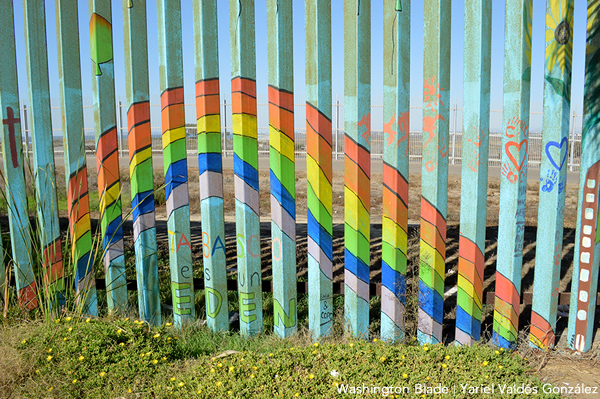
Atravesar este muro y llegar seguros a territorio estadounidense es el deseo de los miles de migrantes varados en Tijuana. Solo buscan una oportunidad de vida en los Estados Unidos. (Foto del Washington Blade de Yariel Valdés González)
Las historias detrás del sueño americano
No es la primera vez que Melani se lanza en dirección norte para tocar suelo estadounidense. En mayo de este año “subió” a Tijuana con otra caravana pero otra agresión le postergó el anhelo. “Me llevé una gran decepción porque oficiales de Tijuana me golpearon cuando me dirigía a la garita de El Chaparral. Luego, fui al hospital y puse una denuncia a los policías en Inmigración”, dice Melani.
Entonces Melani retornó hasta un pueblito entre Guatemala y México, “en territorio ‘nulo’”, dice con la ilusión de que, en algún momento, volvería a caminar hacia su sueño americano. No podía volver a Guatemala, pero tampoco a Tijuana. Por esa época se volvió casi ermitaña. Ella, una chica extrovertida y sociable, vivía alejada de la gente. “Trabajaba en una panadería y de ahí para mi casa. Sin decir alguna palabra, sin saludar”, añade.
Melani huía de una Guatemala donde la violencia se percibe como natural y se manifiesta más aguda contra las comunidades LGBTI. Allí soportan “insultos, sobornos, detenciones arbitrarias y agresiones físicas, que no pocas veces terminan en asesinatos, pero que no se denuncian por temor a las represalias. Las personas LGBTI viven con miedo y no cuentan con redes de apoyo comunitario que les ayuden a enfrentar los escenarios violentos en que habitan”, especifica un diagnóstico sobre la situación de esta comunidad en cuatro países centroamericanos.
Un total de 39 mujeres trans, como Melani, fueron asesinadas de enero a julio de 2017 en Guatemala, según el Observatorio de Personas Trans Asesinadas, ubicando a la nación en el puesto número seis dentro de la lista de países de América Latina y el Caribe con mayores cifras absolutas de personas trans asesinadas.
En Honduras, por otra parte, 40 personas LGTBI han muerto entre 2007 y mayo del presente año, indicó en un comunicado el estatal Comisionado Nacional de los Derechos Humanos en Honduras (Conadeh). Cattrachas, una red lesbiana feminista, indica que 288 personas LGBTI han sido asesinados en Honduras entre 2009 y 2018.
No solo es una situación de inseguridad. Este colectivo en Honduras posee muy bajas posibilidades de empleo. Según reportó Infobae “no existen en el país antecedentes de ninguna persona trans que haya ingresado a un puesto de trabajo en una empresa privada o en una dependencia estatal”.
Amelia Frank-Vitale, antropóloga de la Universidad de Michigan, quien lleva más de un año viviendo en Honduras para estudiar temas de deportación, migración y violencia, confirmó al Blade que “las personas de la comunidad LGBTI están expuestas a todas las formas de violencia que vive cualquier persona en Honduras, que es la mayoría de la población urbana, joven y pobre, pero además están discriminadas, estigmatizadas por su orientación sexual y en muchos casos el Estado está ausente en temas de justicia. Es siempre más crítico para la comunidad LGBTI”.
De esa situación vienen huyendo Alexis Rápalos y Solanyi, dos identidades que habitan un mismo cuerpo robusto de 38 años. En la entrevista con el Blade es Alexis quien habla. Lleva un gorro que cubre una cabeza casi sin pelos y las palabras apenas le salen.
Viene de una familia con bajos recursos y nos ha revelado que, desde los diez años, sufre el flagelo de la discriminación por las calles de su ciudad, San Pedro Sula, la que por cuatro años fue reconocida como la urbe más peligrosa del planeta. De nadie tuvo que despedirse, pues desde que murió su madre hace un año, vive solo.
Sastre y chef de cocina, trabajaba en un restaurante en su país natal, pero decidió sumarse a la caravana en busca de un futuro con más seguridad y una vida sin los sobresaltos de una homofobia generalizada.
Partió sin más que un pantalón y una camisa en su mochila y alcanzó la caravana en la frontera entre Guatemala y México. “Fui descubriendo amigos en la caravana”, refiere Alexis. “Y luego a la comunidad gay. Venimos luchando, peleando muchas cosas porque nos discriminan bastante, nos insultan”.
“El camino ha sido bastante duro”, sostiene Alexis. “A veces nos quedamos dormidos en lugares muy fríos, con tormentas. Yo me enfermé de la gripe con una tos horrible, pero gracias a Dios nos han ayudado con medicinas, con ropa”.
Arribaron a Tijuana pidiendo jalón (auto-stop), a ratos en autobuses y suplicando por la caridad ajena para comer. “Llegamos al albergue que había en la Unidad Deportiva Benito Juárez, pero nosotros estábamos en nuestro grupo aparte. Nos han tratado bien, con ropas, medicinas, comida”, insiste como tratando de agradecer días atenciones recibidas.
Hasta ese albergue, donde las condiciones de insalubridad y hacinamiento eran una constante, los persiguió la homofobia que viaja con algunos de sus coterráneos y los ubica en una posición aún más desfavorable que la del resto. Alexis detalla que eran abucheados en las filas para los alimentos y hubo ocasiones en las que no los dejaron comer. La situación se repetía en las frías duchas a la intemperie, donde la privacidad era un lujo impensable.
Allí, junto a los casi 6.000 centroamericanos que llegaron a aglomerarse en el albergue habilitado por las autoridades de la ciudad, sintió la crudeza del frío de madrugada, durmió en la calle porque no tenía una carpa que lo protegiera y la inusual lluvia de la temporada le humedeció hasta el alma cuando vio empapadas sus pocas pertenencias.
“En el albergue (Benito Juárez) sí pasamos humillaciones, críticas, hasta nos hicieron quitar la bandera gay. Recibimos mucha discriminación, nos dicen que no podemos hacer la misma fila para la comida y para el baño nos dejan de últimos y aquí (Enclave Caracol, nuevo albergue) nos están apoyando demasiado, nos dan nuestro lugar, tenemos baño aparte y todo”, comenta Bairon Paolo González Morera, un gay guatemalteco de 27 años.
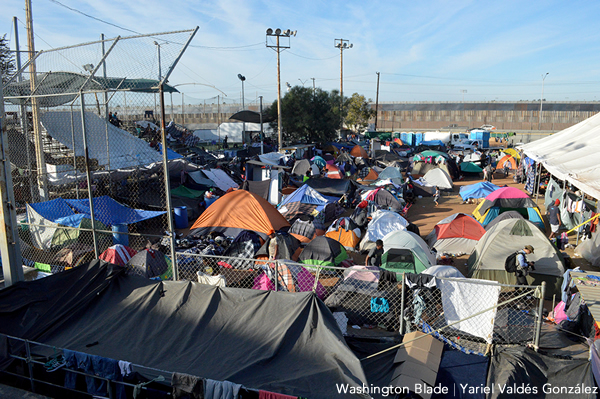
Los integrantes de la caravana LGTBI estuvieron a su llegada a Tijuana en la Unidad Deportiva Benito Juárez, un complejo deportivo convertido en albergue. Allí también fueron discriminados por sus coterráneos. Les hicieron quitar la bandera gay. No los querían en las filas para la alimentación y los dejaban de últimos en las duchas públicas. (Foto del Washington Blade de Yariel Valdés González)
Cuenta Bairon que se travestía por las noches y ejercía la prostitución como Kiara Paola, una actividad que le dejó varias cicatrices en su cuerpo. “Yo me dedicaba a trabajar para llevarle comida a mi hermano gemelo y al más pequeño”, dice. “Ahí mi familia se enteró que era gay. Mi madrastra me discriminó y mi papá no me apoyó y hasta hoy día estoy luchando por mi bienestar, a pesar de que me han dado trabones en la espalda y en diferentes partes de mi cuerpo, pero he salido adelante”.
Vivía solo y constantemente era extorsionado, por lo que decidió unirse a la caravana. Cuando los migrantes arribaron a México, ya trabajaba en un restaurante en Tuxpan y no pensó dos veces unirse a la caravana, que en opinión de la experta en migraciones Frank-Vitale es “un movimiento de desobediencia civil contra un régimen global … La caravana es la forma que se ha reconocido que se puede cruzar México sin estar tan expuesto a los grupos criminales, las autoridades corruptas y sin pagar un coyote para buscar una oportunidad de vivir”.
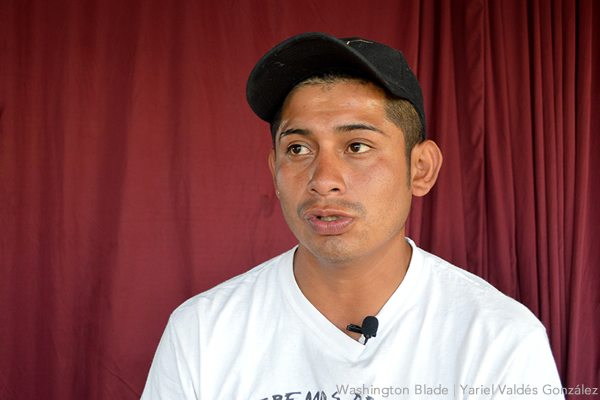
Paolo González Morera, un gay guatemalteco de 27 años, ejercía como trabajador sexual en su país y constantemente era extorsionado y maltratado por su orientación sexual. (Foto del Washington Blade de
Yariel Valdés González)
A la espera del asilo
Una larga fila se ha formado a las afueras del Enclave Caracol, un espacio comunitario ubicado en la calle primera, en el centro de Tijuana, que ha acogido a esta fracción de la caravana LGBTIQ, que llegó semanas después de la primera.
Bajo unas carpas, los propios migrantes se organizan para repartir la comida que ellos mismos han preparado en el interior del edificio, que semanas antes también brindó su espacio para el matrimonio de varias parejas gays.
Nacho, quien prefirió solo presentarse así, es colaborador de Enclave Caracol, y dijo que están apoyando “a la comunidad con la alimentación y agua, el uso de baño, acceso a Internet, uso de teléfonos para que puedan llamar prácticamente a cualquier parte del mundo y en algún momento ha funcionado como albergue”.
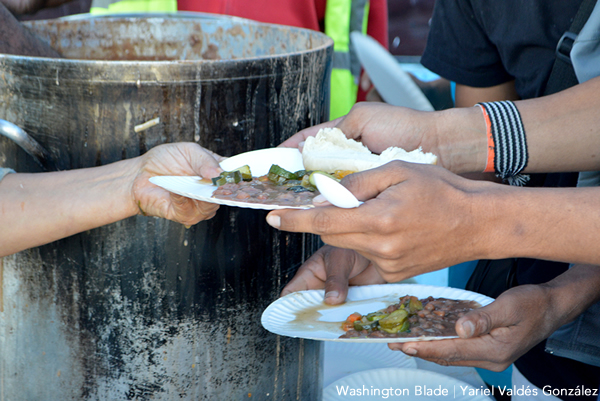
En el Enclave Caracol, son los propios migrantes quienes han cocinado y organizado la vida allí. Con las donaciones de la sociedad civil de varias ciudades ha sido posible mantener a las decenas de ellos que
allí se resguardan. (Foto del Washington Blade de Yariel Valdés González)
En los primeros días de auxilio a estos desplazados eran los trabajadores del lugar quienes cocinaban gran parte de los alimentos y garantizaban la limpieza. Pero, dice “poco a poco se han ido involucrando personas de la caravana. Actualmente ninguna persona del Enclave ha estado en la cocina. Estas últimas semanas hemos recibido donaciones y también hemos ido a los mercados por la merma y la limpiamos, la procesamos y se cocina. Ellos mismos están organizando la limpia y entrega de la comida”.
Nacho declaró que varias personas de la sociedad civil de Los Ángeles, San Diego y de la propia ciudad de Tijuana aportan dinero, comida, voluntariado, productos de limpieza, platos y vasos desechables para aliviar la tensa situación que se vive ahora mismo por la llegada de miles de migrantes a esta urbe fronteriza, muchos de los cuales no han iniciado su proceso de asilo político.
Y es que, al decir de la académica Frank-Vitale, este proceso se ha puesto intencionalmente difícil en EEUU. “Hay una lista muy larga de personas que solicitan el asilo, que se han entregado en la garita y buscan seguir el proceso correcto, bajo la ley internacional”, dice. “Se ha dicho que van a tener que esperar hasta dos meses para tener la oportunidad de hablar de su caso, y eso para personas vulnerables, que huyen de una persecución, que viven bajo la lluvia, el frío, a la intemperie todo ese tiempo, la verdad es una crisis humanitaria fatal”.
“A veces uno se desespera porque no hay un lugar estable. Nos vamos de aquí para allá. Dicen que hoy nos van a llevar para otra casa para esperar a los abogados que nos van a ayudar con los papeles”, dice esperanzado Alexis.
Sin embargo, Melani es más realista al comentar sobre su petición de asilo: “La situación de nosotros está un poco difícil porque siguen llegando muchas personas. Donald Trump cerró la frontera y el trámite está muy complicado. Por eso las personas van a la frontera a meter presión”.
Frank-Vitale considera que el actual sistema de asilo debe cambiar para reconocer las formas modernas de violencia y persecución a las que se ven expuestas las personas y en especial los grupos LGTBI. “Tomando todo eso en cuenta, sí es posible. Hay casos de Centroamérica que entran perfectamente en el sistema, siempre y cuando tengan realmente el temor por sus vidas en sus países y mucha gente tiene un miedo muy verdadero”.
Ese temor, que ha colmado gran parte de la vida de Melani, la acompañará, incluso, en territorio norteamericano, pues en “la caravana anterior había una chica que se llamaba Roxsana, quien murió porque tenía VIH, pero la autopsia reveló que había sido agredida por los oficiales del Servicio de Inmigración y Control de Aduanas (ICE) de Estados Unidos”.
La primera autopsia realizada en Hernández, una mujer trans hondureña con VIH que murió bajo custodia de ICE en Nuevo México el 25 de mayo, menciona la causa de muerte como un paro cardíaco. La segunda autopsia a la que se refirió Melani muestra que Hernández fue golpeada, pero no identifica las personas que la atacaron mientras estaba bajo custodia.
La autopsia original realizada en Hernández, una mujer trans hondureña con VIH que murió bajo custodia de ICE en Nuevo México el 25 de mayo, menciona la causa de la muerte como un paro cardíaco. La segunda autopsia a la que se refirió Melani muestra que Hernández fue golpeado, pero no identifica quién la atacó mientras estaba bajo custodia.
El tema ha llegado hasta el Senado estadounidense, pues tres senadores invitaron recientemente al Servicio de Aduanas e Inmigración y Aduanas y Protección de Fronteras de EEUU a entregar documentos relacionados con el caso de Roxsana, una mujer trans hondureña con VIH que murió bajo su custodia el año pasado.
Pese a todas estas situaciones, pese a un presidente xenófobo que comanda al otro lado, pese a un poderoso ejército atrincherado en la frontera, pese a las largas filas para ser escuchados, pese a la incertidumbre constante, Bairon se mantiene firme en su decisión: “Ya estamos acá. Con tanto trabajo que nos costó, yo no regreso”.
Ya sabemos por qué.
Federal Government
HHS reverses Trump-era anti-LGBTQ rule
Section 1557 of the Affordable Care Act now protects LGBTQ people
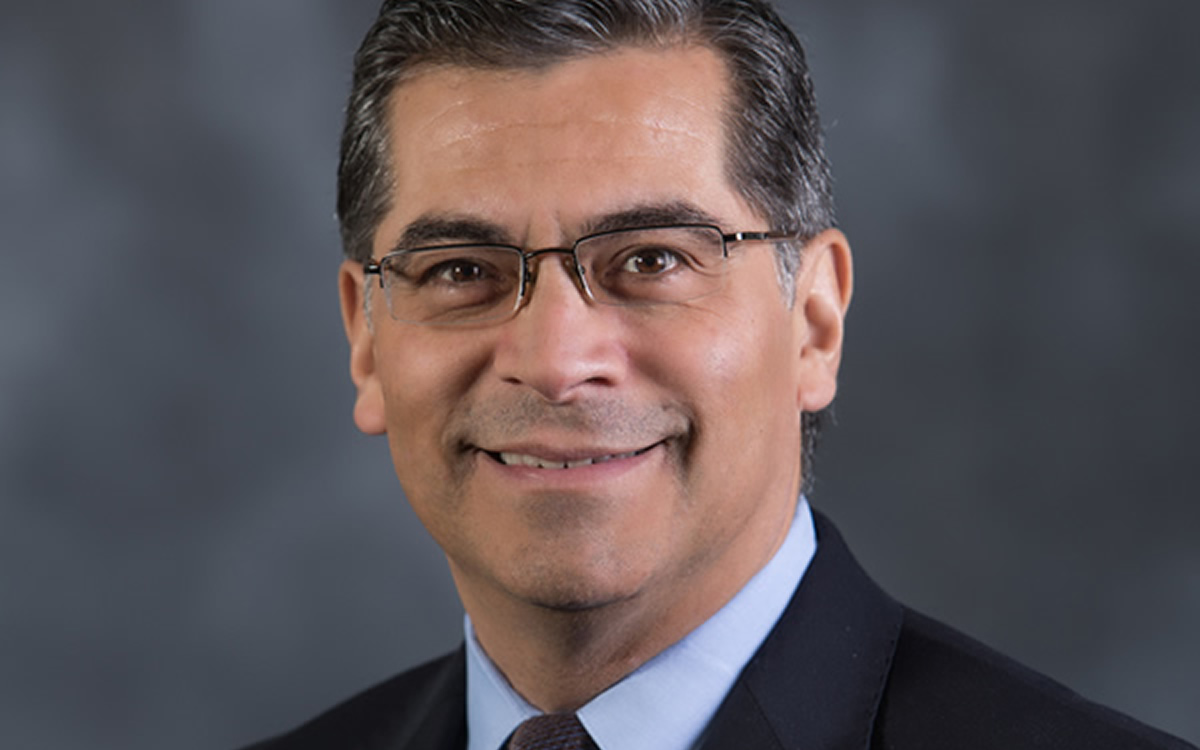
The U.S. Department of Health and Human Services Office for Civil Rights has issued a final rule on Friday under Section 1557 of the Affordable Care Act advancing protections against discrimination in health care prohibiting discrimination on the basis of race, color, national origin, age, disability, or sex (including pregnancy, sexual orientation, gender identity, and sex characteristics), in covered health programs or activities.
The updated rule does not force medical professionals to provide certain types of health care, but rather ensures nondiscrimination protections so that providers cannot turn away patients based on individual characteristics such as being lesbian, gay, bisexual, transgender, queer, intersex, or pregnant.
“This rule ensures that people nationwide can access health care free from discrimination,” said HHS Secretary Xavier Becerra. “Standing with communities in need is critical, particularly given increased attacks on women, trans youth, and health care providers. Health care should be a right not dependent on looks, location, love, language, or the type of care someone needs.”
The new rule restores and clarifies important regulatory protections for LGBTQ people and other vulnerable populations under Section 1557, also known as the health care nondiscrimination law, that were previously rescinded by the Trump administration.
“Healthcare is a fundamental human right. The rule released today restores critical regulatory nondiscrimination protections for those who need them most and ensures a legally proper reading of the Affordable Care Act’s healthcare nondiscrimination law,” said Omar Gonzalez-Pagan, counsel and health care strategist for Lambda Legal.
“The Biden administration today reversed the harmful, discriminatory, and unlawful effort by the previous administration to eliminate critical regulatory protections for LGBTQ+ people and other vulnerable populations, such as people with limited English proficiency, by carving them out from the rule and limiting the scope of entities to which the rule applied,” Gonzalez-Pagan added. “The rule released today has reinstated many of these important protections, as well as clarifying the broad, intended scope of the rule to cover all health programs and activities and health insurers receiving federal funds. While we evaluate the new rule in detail, it is important to highlight that this rule will help members of the LGBTQ+ community — especially transgender people, non-English speakers, immigrants, people of color, and people living with disabilities — to access the care they need and deserve, saving lives and making sure healthcare professionals serve patients with essential care no matter who they are.”
In addition to rescinding critical regulatory protections for LGBTQ people, the Trump administration’s rule also limited the remedies available to people who face health disparities, limited access to health care for people with Limited English Proficiency, and dramatically reduced the number of healthcare entities and health plans subject to the rule.
Lambda Legal, along with a broad coalition of LGBTQ advocacy groups, filed a lawsuit challenging the Trump administration rule, Whitman-Walker Clinic v. HHS, and secured a preliminary injunction preventing key aspects of the Trump rule from taking effect.
These included the elimination of regulatory protections for LGBTQ people and the unlawful expansion of religious exemptions, which the new rule corrects. The preliminary injunction in Whitman-Walker Clinic v. HHS remains in place. Any next steps in the case will be determined at a later time, after a fulsome review of the new rule.
GLAAD President Sarah Kate Ellis released the following statement in response to the news:
“The Biden administration’s updates to rules regarding Section 1557 of the ACA will ensure that no one who is LGBTQI or pregnant can face discrimination in accessing essential health care. This reversal of Trump-era discriminatory rules that sought to single out Americans based on who they are and make it difficult or impossible for them to access necessary medical care will have a direct, positive impact on the day to day lives of millions of people. Today’s move marks the 334th action from the Biden-Harris White House in support of LGBTQ people. Health care is a human right that should be accessible to all Americans equally without unfair and discriminatory restrictions. LGBTQ Americans are grateful for this step forward to combat discrimination in health care so no one is barred from lifesaving treatment.”
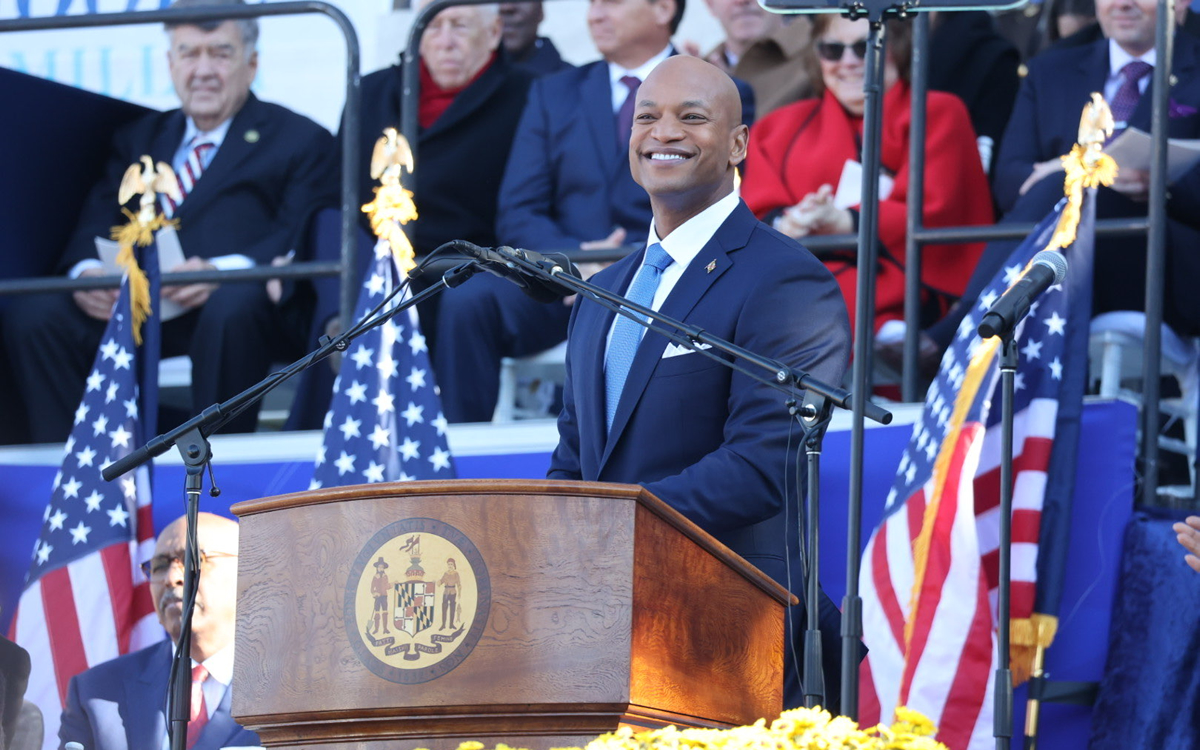
Maryland Gov. Wes Moore on Thursday signed a bill that seeks to combat efforts to ban books from state libraries.
House Bill 785, also known as the Freedom to Read Act, would establish a state policy “that local school systems operate their school library media programs consistent with certain standards; requiring each local school system to develop a policy and procedures to review objections to materials in a school library media program; prohibiting a county board of education from dismissing, demoting, suspending, disciplining, reassigning, transferring, or otherwise retaliating against certain school library media program personnel for performing their job duties consistent with certain standards.”
Moore on Thursday also signed House Bill 1386, which GLSEN notes will “develop guidelines for an anti-bias training program for school employees.”

The Mexican Senate on Thursday approved a bill that would ban so-called conversion therapy in the country.
Yaaj México, a Mexican LGBTQ rights group, on X noted the measure passed by a 77-4 vote margin with 15 abstentions. The Chamber of Deputies, the lower house of Mexico’s congress, approved the bill last month that, among other things, would subject conversion therapy practitioners to between two and six years in prison and fines.
The Senate on its X account described conversion therapy as “practices that have incentivized the violation of human rights of the LGBTTTIQ+ community.”
“The Senate moved (to) sanction therapies that impede or annul a person’s orientation or gender identity,” it said. “There are aggravating factors when the practices are done to minors, older adults and people with disabilities.”
Mexico City and the states of Oaxaca, Quintana Roo, Jalisco and Sonora are among the Mexican jurisdictions that have banned the discredited practice.
The Senate in 2022 passed a conversion therapy ban bill, but the House of Deputies did not approve it. It is not immediately clear whether President Andrés Manuel López Obrador supports the ban.
Canada, Brazil, Belgium, Germany, France, and New Zealand are among the countries that ban conversion therapy. Virginia, California, and D.C. are among the U.S. jurisdictions that prohibit the practice for minors.
-

 District of Columbia4 days ago
District of Columbia4 days agoCatching up with the asexuals and aromantics of D.C.
-

 South America4 days ago
South America4 days agoArgentina government dismisses transgender public sector employees
-

 Maine5 days ago
Maine5 days agoMaine governor signs transgender, abortion sanctuary bill into law
-

 Mexico3 days ago
Mexico3 days agoMexican Senate approves bill to ban conversion therapy

